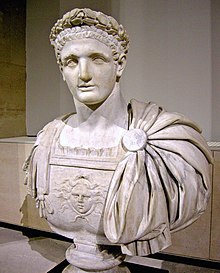
Back Domitianus AF Domitian ALS Domicián AN دوميتيان Arabic دوميتيان ARZ Domicianu AST Domisian AZ ایکینجی یتیان AZB Даміцыян BE Домициан Bulgarian
| Domitian | |||||||||
|---|---|---|---|---|---|---|---|---|---|
 Bust in the Louvre | |||||||||
| Roman emperor | |||||||||
| Reign | 14 September 81 – 18 September 96 | ||||||||
| Predecessor | Titus | ||||||||
| Successor | Nerva | ||||||||
| Born | Titus Flavius Domitianus[1] 24 October 51 Rome, Italy, Roman Empire | ||||||||
| Died | 18 September 96 (aged 44) Rome, Italy | ||||||||
| Burial | Rome | ||||||||
| Spouse | Domitia Longina (m. 70) | ||||||||
| Issue | |||||||||
| |||||||||
| Dynasty | Flavian | ||||||||
| Father | Vespasian | ||||||||
| Mother | Domitilla | ||||||||
| Roman imperial dynasties | ||
|---|---|---|
| Flavian dynasty | ||
| Chronology | ||
|
69–79 AD |
||
|
79–81 AD |
||
|
81–96 AD |
||
| Family | ||
|
||
Domitian (/dəˈmɪʃən, -iən/, də-MISH-ən, -ee-ən; Latin: Domitianus; 24 October 51 – 18 September 96) was Roman emperor from 81 to 96. The son of Vespasian and the younger brother of Titus, his two predecessors on the throne, he was the last member of the Flavian dynasty. Described as "a ruthless but efficient autocrat",[6] his authoritarian style of ruling put him at sharp odds with the Senate, whose powers he drastically curtailed.
Domitian had a minor and largely ceremonial role during the reigns of his father and brother. After the death of his brother, Domitian was declared emperor by the Praetorian Guard. His 15-year reign was the longest since Tiberius.[b] As emperor, Domitian strengthened the economy by revaluing the Roman coinage, expanded the border defenses of the empire, and initiated a massive building program to restore the damaged city of Rome. Significant wars were fought in Britain, where his general Agricola made significant gains in his attempt to conquer Caledonia (Scotland), and in Dacia (Modern-day Romania), where Domitian was unable to achieve a decisive victory against King Decebalus. Domitian's government exhibited strong authoritarian characteristics. Religious, military, and cultural propaganda fostered a cult of personality, and by nominating himself as perpetual censor, he sought to control public and private morals.
As a consequence, Domitian was popular with the people and the army, but considered a tyrant by members of the Roman Senate. Domitian's reign came to an end in 96 when he was assassinated by court officials. He was succeeded the same day by his advisor Nerva. After his death, Domitian's memory was condemned to oblivion by the Senate, while senatorial and equestrian authors such as Tacitus, Pliny the Younger, and Suetonius propagated the view of Domitian as a cruel and paranoid tyrant. Modern revisionists have instead characterized Domitian as a ruthless but efficient autocrat whose cultural, economic, and political programs provided the foundation of the peaceful second century.
- ^ a b Cooley, Alison E. (2012). The Cambridge Manual of Latin Epigraphy. Cambridge University Press. p. 491. ISBN 978-0-521-84026-2.
- ^ Garzetti, Albino (2014). From Tiberius to the Antonines: A History of the Roman Empire AD 14–192. Routledge Revivals. Routledge. pp. 266, 833. ISBN 978-1-317-69844-9.
- ^ Deroux, Carl (2010). Studies in Latin Literature and Roman History. Vol. 323. Latomus. p. 283.
- ^ Vagi, David L. (2012). Coinage and History of the Roman Empire, C. 82 B.C. – A.D. 480: History. Taylor & Francis. p. 212. ISBN 978-1-57958-316-3.
- ^ a b Hammond, Mason (1956). "The Transmission of the Powers of the Roman Emperor from the Death of Nero in A.D. 68 to That of Alexander Severus in A.D. 235". Memoirs of the American Academy in Rome. 24: 61–133. doi:10.2307/4238640. JSTOR 4238640.
- ^ Cite error: The named reference
gowing-domitian-reviewwas invoked but never defined (see the help page).
Cite error: There are <ref group=lower-alpha> tags or {{efn}} templates on this page, but the references will not show without a {{reflist|group=lower-alpha}} template or {{notelist}} template (see the help page).